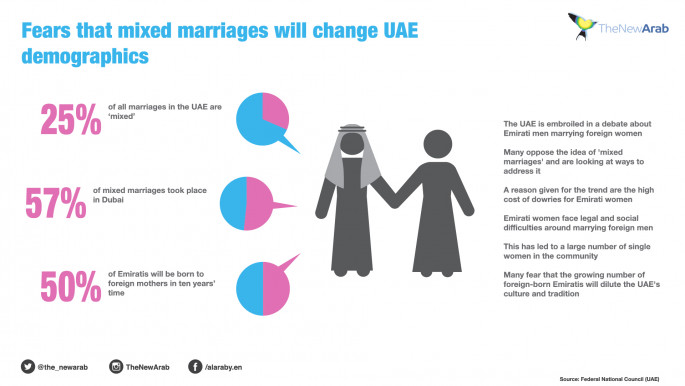UAE parliament takes aim at 'mixed marriages'
Concerns are growing about the rising number of "mixed marriages" in the United Arab Emirates with the Gulf country forming a committee to investigate the trend.
Representatives of the UAE's Federal National Council debated the issue on Wednesday, and were told that a growing number of men are choosing non-Emiratis as their spouses.
This is leading a demographic imbalance in the country, the council was told, as more-and-more Emirati women are unable to find husbands.
"The marriage fund and the ministry of community development have to tackle this serious problem and find solutions," said Hamad al-Rohoomi, a council member who highlighted the issue on Wednesday.
"The figures of mixed marriages are appalling if the number of children born to foreign mothers is added to children born to unknown parents."
Bond
Around a quarter of marriages in the UAE are now mixed, according to the country's national council members.
"This affects the national identity," said Rohoomi in the council. "If Emirati men marry expats, then who will the Emirati women get married to?"
Rules in the UAE make it easier for Emirati men to marry foreign women than for vice-versa.
Nationality laws also allow foreign spouses married to Emirati men to adopt nationality after three years. The process is much longer and more convoluted - some would say discouraged - for foreign husbands.
Emirati society also tends to accept the idea of men marrying foreign women more easily than the other way round.
One of the reasons why more Emirati men are marrying foreign women, some say, is high dowry and marriage costs at home.
 |
The fund will organise several lectures for parents across the UAE warning them of the negative impacts which might result from Emiratis marrying foreigners. - Maitha Salem al-Shamsi, Marriage Fund |
 |
In 2014, around 30 percent of marriages involving Emirati men were to foreign women, Hamad al-Rohoomi told the council on Wednesday.
Like many other countries in the Gulf, the UAE can be obsessive about retaining its traditions and values, while the country's expatriate community continues to grow. They are often - by more reactionary elements within society - convenient scapegoats for the country's ills.
There is a growing belief among many non-Emiratis that the so-called tolerance of the UAE is just a facade, and deep-rooted distrust - even dislike - of foreigners exist.
This leads to a particularly complicated relationship, where expatriates make up to nine-in-ten of the population, and many Emiratis feel their country is no longer their own.
Foreign women taking nationality - and bringing up the next generation of Emiratis - are viewed as a potential danger to the UAE's culture and traditions.
Many have blamed "mixed marriages" for the UAE leading the Arab world in divorce rates.
In ten years' time, half of Emirati children will be born to mothers from outside the country, Rohoomi said.
Nationalism
So grave is this threat considered that the government has spent millions of dollars to combat the trend. A marriage fund has been set up to provide lower income Emiratis with the money needed for dowries to marry their compatriots.
"The priority of the ministry of community development and the marriage fund was to build a cohesive society which gains its strength from UAE family traditions," The National reported Minister of Social Development Najla Mohammad al-Awar saying.
 |
Four years ago, chairperson of the marriage fund Maitha Salem al-Shamsi explained the aims of the foundation.
"The fund will organise several lectures for parents across the UAE warning them of the negative impacts which might result from Emiratis marrying foreigners."
However, marriage between different peoples has a long history in the UAE. But in a country where tribe and lineage are considered important, this fact is often ignored.
Identity has also been strengthened after government efforts to promote Emiratisation and nationalism in general, hightened recently following the UAE's involvement in the Yemen war against Houthi rebels.
However, there are many who fear that divisions and segregation are creeping further into mainstream Emirati thought.
"I think the ethno-politics and the attacks are becoming more strong, they're becoming more aggressive," Rima Sabban, an associate professor of sociology at Zayed University, told The National in 2013.
An example of this is children from non-UAE born parents being bullied or feeling isolated from other members of society.
"The issue of identity and who you are and where you're coming from is becoming more aggressive, and people are becoming more vocal. Nationalism is definitely an issue."





 Follow the Middle East's top stories in English at The New Arab on Google News
Follow the Middle East's top stories in English at The New Arab on Google News


